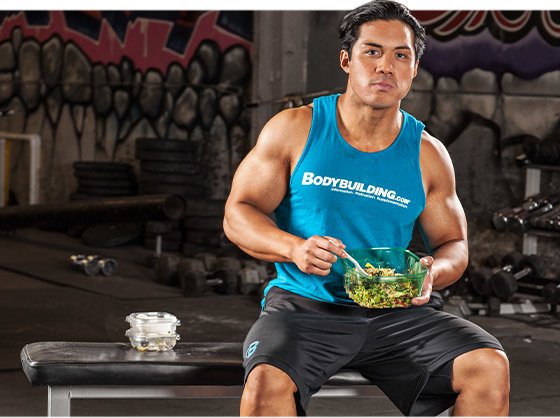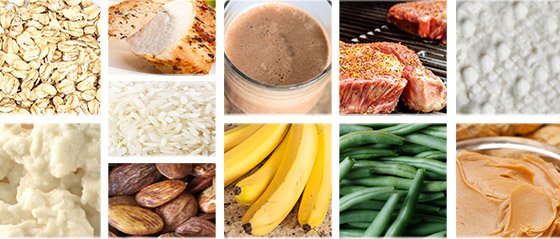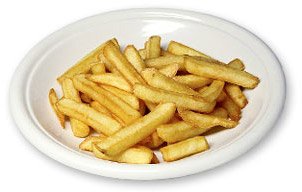Clean eating. We've all seen it held up as the best way—the only way—to live a fit life, look and perform like an athlete, and not die before our time. Of course, clean eating has a dirty little secret: It always comes alongside its greasy sidekick, the cheat meal.
This makes me sad, and it irks me. I'm talking about the whole clean/cheat setup, and really, the whole idea of "clean." I've spent time on the darkest side of clean eating—namely an eating disorder—and I think it's time for this way of thinking to die. My job now is to spread the gospel of flexible dieting.
Many of you might be familiar with that term, but it's probably from misguided articles and forum posts ridiculing the idea of IIFYM (aka, "if it fits your macros"). If you're a clean eater, you may have made some snarky remark a time or two about us flexible dieters being unhealthy. Perhaps you've even commented on our moral character. We're bad people, we're going to hell for eating pretzels, and we should be ashamed of ourselves because we eat our baked potatoes with butter. The gall!
Enough with the snarky name-calling! Let me show you the truth, the way, and the light to food freedom! The first step is to debunk the most common myths about flexible eating.

Myth 1 Flexible dieters eat a bunch of crap all day long
False! Eating a bunch of crap is ... well, crap. That's the typical American diet, and it's far from what constitutes flexible dieting.
Key components of flexible dieting include
- Overall mindfulness of macronutrient and micronutrient intake, whether you count macros. This means that you're aware of approximately how much protein you consume, and that you also get sufficient fiber.
- Understanding that treats and junk food are allowed, but not as the norm. I like to recommend an 80/20 rule. Other people lean toward 90/10; that still feels fairly restrictive to me.
- Portion control. This is vital. There's a difference between 1 doughnut and 12, and you don't abuse this. Think a handful of gummy bears rather than a whole bag. A small serving of sweet potato fries with a chicken salad. A glass of wine to complement a steak.
So what do flexible dieters eat? Primarily whole food sources, with a sprinkling of fun indulgences on the side. If the typical American is going to eat a croissant and a glass of orange juice for breakfast, he is not a flexible dieter. What a flexible dieter might do instead is throw in an omelet with that meal, keep the croissant, and then choose better carb sources for the rest of the day. Why? Because, a croissant is a treat.
Believe me, I've definitely tried to get in my protein and fiber through junk food alone, and it can't be done. There's no realistic way to meet your daily nutrient needs through chocolate and gummy bears. Besides, who wants to survive on a steady diet of nothing but sugar and fat? That would make anyone sick. In fact, it's making plenty of people sick all around us, all the time. It's called type-2 diabetes.
And if you do end up having a particularly treat-heavy day, then the next day, you rein it in a little. You don't obsess over it; you don't worry about it; you just move on. It's all about checks and balances. Don't mistake that for bingeing and purging—there's a big difference.
Myth 2 Clean eating is always healthy eating
What's healthy about a restricted food list? There is nothing positive that can come out of putting a whole slew of foods off-limits and shackling yourself to specific food items. Let's take a look at your clean diet for a second:

Meal 1: Oats and egg whites for breakfast
Meal 2: Chicken, white rice, and almonds for lunch
Meal 3: Protein shake with a banana post-workout
Meal 4: Lean beef and green beans for dinner
Meal 5: Casein or cottage cheese before bed, maybe with peanut butter
Repeat. Repeat. Repeat. And let's be honest, I've given a generous portrayal of a clean diet there. The real thing is often far, far more repetitive.
Yes, I understand that consuming a nutrient-dense diet is incredibly healthy. But that's not what "clean eating" is. There is an incredibly high correlation between exclusive eating (i.e., limiting food choices) and binge eating. This is no coincidence. Study after study has shown that as soon as you deem a food forbidden, your desire for it increases even more, even if you may have never wanted it in the first place.
Not allowed to eat chocolate? All of a sudden, that's all you can think about.
On the flipside, having the option to consume a treat doesn't mean that you will necessarily chow down on it. Rather, it means that you won't be using up your willpower to actively resist the food.
Myth 3 Clean eating with immense "cheat" meals is the same thing as flexible eating
You tell me what's worse for your health:
- Eating a square of chocolate every evening, savoring every bit of it, and then moving on with your life, OR
- Hurriedly scarfing down not one, not two, but three whole chocolate bars in one sitting with no self-control whatsoever and then feeling guilty—not to mention bloated—for the entire next day, if not longer.
I think the answer is obvious.
Newsflash: It's entirely possible for a flexible dieter to eat the same way as a clean eater most of the time. Yet come Saturday night, the clean eater may go out to dinner for his weekly cheat meal and have a burger, French fries, and a milkshake, followed by cheesecake for dessert, and then come home and eat everything but the kitchen sink. The flexible dieter, on the other hand, can have the same burger and French fries and have no problem stopping there. Hell, he may not even finish the fries because he's reasonably full and feeling satisfied.
Do you see the difference here? The flexible dieter hasn't lost touch with what satisfaction feels like. Throughout the week, the flexible dieter stuck to whole food sources not because he had to but because he wanted to. He had no problems whatsoever with controlling his food intake on the weekend.
"But sugar is bad for me," a clean eater might proclaim. Well, did it ever occur to you that the only times you allow yourself to consume too much added sugar is when you binge?
Sugar itself may not be the culprit. After all, apples contain sugar. It's the massive quantity of added sugar you consume in one sitting that makes you sick.
Myth 4 Flexible dieters follow weird or bogus macros
Not all flexible dieters choose to count their macros. But for those who do, the guidelines for determining macronutrient guidelines aren't too different from those of bodybuilders and other strength athletes.
Namely, protein intake is usually around 1 gram per pound of bodyweight, and carbs are 0.6-1.5 grams per pound, depending on goals, the leanness of the individual, carb tolerance, body type, metabolic capacity, age, and activity level. Fats fill in the remaining calorie allotment. People who are striving for muscle gain naturally will have a higher calorie allotment, 16 times bodyweight or upward. People who are looking to lose weight would start off closer to 10-12 times bodyweight.
Let's use me as an example. I'm a 24-year-old female mesomorph, 115 pounds, with approximately 18 percent body fat. I train five days each week with a low-to-medium activity level for my job. I would calculate my maintenance macros for training days as follows:
Total Calories: 115 pounds x 15 = 1,725
Protein: 1 g/lb. bodyweight = 115 g, or 460 cal (4 cal/g protein)
Carbs: 1.5 g/lb. bodyweight = 173 g, or 692 cal (4 cal/g carbs)
Fats (total remaining calories): 1,725 - 460 - 692 = 573 fat calories, or 64 g fats (9 cal/g fat)
Some flexible dieters like to carb cycle between training days and off days like I do, not only for the physiological benefits but also because it affords them the leeway to fit in higher-carb treats on training days and, conversely, higher-fat treats on off days. My off-day macros might look like this:
Total Calories: 115 pounds x 15 = 1,725
Protein: 1g/lb bodyweight = 115 g, or 460 cal (4 cal/g protein)
Carbs: 1 g/lb. bodyweight = 115 g, or 460 cal (4 cal/g carbs)
Fats (total remaining calories): 1,725 - 460 - 460 = 805 fat calories, or 89 g (9 cal/g fat)

Having 89 fat grams for an off day would allow me to consume foods including, but not limited to full-fat cheese, coconut oil, nut butters, and maybe even some fried goodness.
This is just one of many possible approaches to the macro puzzle. Flexible dieting is all about honoring your personal preferences with regard to macronutrient amounts, food choice, meal timing. This will allow you to adhere to your program and consequently yield the best results.
Myth 5 Flexible dieters believe that eating a cheeseburger is the same as eating a lean cut of steak
Look up #flexibledieting hashtags on Instagram and all you'll see is the ice cream, Pop Tarts, and burgers that we consume. But what the pictures don't tell you is that those foods actually make up a small portion of our daily food. We typically don't show off the chicken breast, sweet potatoes, and veggies we consume. Why? Because it's way more fun to talk about our treats.
So no, a cheeseburger is not the same thing as eating a high-quality cut of protein. But if we decide to order that burger, it's because we've been eating well recently, weighed our options, and perhaps even factored the meal into our macros. We've decided that that's what we truly wanted to eat, and we have no qualms about indulging our taste buds for a night.
Again, flexible dieters prescribe to an 80/20 rule or some variation. We care about our health just as much as a clean eater does, but we also understand that to make a lasting lifestyle change, we need to create sustainable habits. We have no timeline to get to where we want to be; we're all about enjoying the ride.
Are you a flexible dieter? If not, what are you waiting for? Freedom awaits you. Are you a clean-eating diehard? Make your case in the comments.
Recommended For You

Eat, Lift, Grow: 4 Rules To Help Build A Performance Machine
Elite strength athletes and amateurs alike know that their training will only go as far as the food that fuels it. Build your nutritional strategy around these four rules and you can't fail!
5 Ways Cheat Meals Can Improve Your Body!
Cheat meals don't have to spell diet disaster. In fact, a well-structured cheat meal can help you surmount weight-loss plateaus! Cheat smart with these must-read tips.



TWEET THIS ARTICLE: Feeling unsatisfied with the same old clean/cheat cycle? Learn the truth about #flexibledieting!